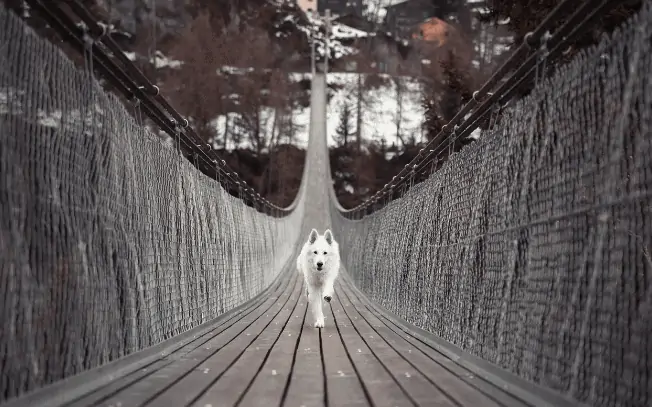Last Updated on

Imagine how your body stiffens after a long drive across the Interstate. Your dog is no exception and he too gets exhausted and weary during the journey. Especially adversities multiply for the senior dogs. Travelling with an ageing senior canine is equivalent to travelling with a 90-year-old human. A dog year is 7 human years on an average (large dog breeds age quickly) and that demands the extra care and precautions for the good fortune of your lovely senior dog citizen on your getaway.
Your senior dog may have severe multiple health conditions and you have to be geared up for the things that might go far worse than you expected on your tour. Go through these tips before you step out of your comfy home for a long journey.
1. Get Your Senior Dog to the Vet for Health Assessment
You may feel your senior dog is feeling fine and is ready to travel with all his food and current medication. But it is necessary to go through a health checkup once before leaving. Your vet knows more about your destination and what health problems are more common in that particular region.
The most important thing is to talk to your vet about your dog’s chronic diseases and run the necessary tests on him to make sure he is good to go and there’s nothing which would need immediate treatment in near future. Most common chronic diseases for senior dogs are Arthritis, Heart disease, Obesity.
2. Determine Your Dog Suffers from Motion Sickness or Not
The next thing you should be consulting about is the motion sickness of your senior dog. Motion sickness can result in stress and confusion and recovery from this condition is a bit tough for senior dogs than young ones.
Inactivity, uneasiness, yawning, whining, vomiting, excessive drooling, and licking or smacking of the lips are few indications of motion sickness in dogs. If you have previously observed these symptoms in your ageing canine buddy then follow your vet’s advice to monitor these symptoms and whether or not travel with him.
3. Consult the Vet about Your Senior Canine’s Mental Health
Recovering from mental trauma for a senior fido is more difficult than young canines. This warrants a vet visit for keeping a check on his mental health. Ageing doggies are more prone to cognitive dysfunction or commonly known as dog dementia.
Some symptoms for the cognitive dysfunction are wandering aimlessly, urinating indoors, defecating indoors, extreme agitation, and anxiety.
4. Make Sure Your Dog Is up to Date with the Vaccination and the Microchipping
Regardless of travelling domestically or internationally, you have to have your ageing dog’s vaccination up to date and carry the certificate with you on your trip. There can be places where you need to produce it for entry or for your stay in hotels.
You will never want to think your dog gets lost on the unknown streets on your journey. Microchipping will let you know your dog’s location if you won’t see him where you left him before having your lunch in the hotel restaurant.
5. Be Ears to Your Canine Pal
Planning in advance for your senior dog’s walk to loosen up the stiff muscles during car travel, his meals, and exercise is good. But the things aren’t the same while you’re travelling. If your dog is detesting against your plans for his exercise that may mean your dog feels excruciating joint pains or anxiety and needs to rest instead.
You’re the person who understands your dog the most. So, listen to his whines, and his actions. Be ears to him and make changes in your plans accordingly.
6. Keep Things as Familiar as Possible for Your Doggie
Dogs need time to get used to new things. Your senior canine won’t easily get accustomed to his new water and food bowls, dog beds, new toys, and new accessories. I know bringing as many things with you in your car trunk and lugging dog beds and other things would be tedious but it will be all worth in the end.
In a nutshell, keeping things as familiar as possible will let your dog use his own things without any discomfort and doze off when he needs to.
7. Protect Their Joints
Car drive for seven to eight hours will make your body stiff as well as your senior dog’s. Whenever you’re taking a break to loosen up your muscles, help your dog to rise and walk along with you slowly to help him be relaxed.
Old age and constantly travelling make joints pain. Never compromise with your dog’s bed. Bringing a simple mat instead of his memory or orthopedic foam dog bed is not the right decision. That might save up some space but won’t get your dog the comfort he needs.
8. Stay Calm
This tip may seem clichè to you but yet it has a lot to do with your ageing canine’s mental health. When your takeaway food has missing items or gets frustrated by the increased fuel prices and to express your feelings your dog will get wrong messages. Dogs can understand your emotions.
So try to stay as calm as possible for your dog’s sake. As I’ve already mentioned, recovering from mental trauma is difficult for senior dogs.
9. Make a backup plan
You may have made the best assumptions with all the conditions you might be facing but sometimes odds can make your plans fall like a castle of cards. You might have chosen the best accommodation for you and your pets but what if you don’t make it on time to reach your destination on time and you will have to change your entire plan?
Every place, restaurants, hotels have their own set of restrictions regarding pets and accessories. So be ready to execute the plan B. Research and add a few more places, accommodation, and restaurants to your plan to tackle the contingency. Prior research can save a lot of time and prevent hassle.
Takeaway
Travelling with a senior dog is quite different than a younger companion or a pup. Everything gets a bit more complex with senior dogs while travelling. However, there’s no need to overthink whether you should bring your canine friend or not, just roll out, put a harness on your dog and enjoy your vacation.The most important tip is to take your vet’s advice. Go through all the tips and that’s all you will need. Enjoy outings with your doggie and make memories.
This article may include affiliate links. www.travellingwithadog.com is a participant of Amazon.com Services LLC Associates Program. As an Amazon Associate, I earn a commission from qualifying purchase. www.travellingwithadog.com participates in other affiliate programs, and recieves commissions when purchases are made through the links. The cost is not inflated to account for the commission earned.
Veterinary Disclaimer: travellingwithadog.com is not a substitute for veterinary advice and does not intend to provide any type of veterinary advice for your animals. Please consult your vet for any questions you have regarding your pets health.
Clara Lou is Co-founder and the Head of Marketing at Petlovesbest.com. Pet Loves Best is a one-stop solution for all your pet supplies shopping and pet-related queries.

